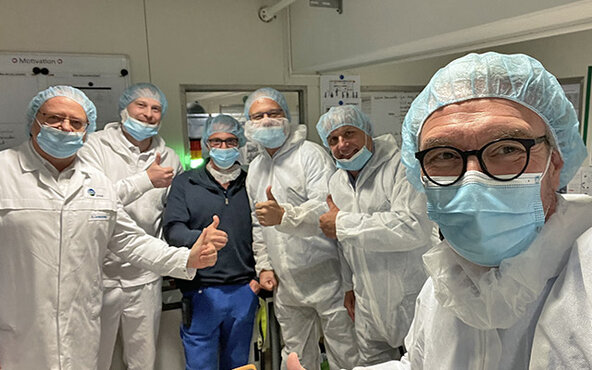
The TIGER programme is based on the following approach: everyone in the company is encouraged and expected to contribute in order to jointly find solutions for redesigning the work environment, collaboration, processes, and workflows in a new, better, and more cost-effective way. As a central method, "shop floor management" was introduced in both the production plants and administration.
Recognise, discuss, improve
In practice, this means: each team meets regularly to discuss current issues in its area, deviations from target objectives, and countermeasures. The team meets either on site in front of a whiteboard or via a digital format. Important information, such as goals, key figures, current problems, priorities and measures, is made visible on the shop floor board. Everyone reports on their area of expertise and their key figures. By everyone looking at the shop floor board together, problems and deviations can be identified more quickly, and countermeasures, initiated. "Good shop floor management strengthens cooperation, creates transparency, and helps the manager to lead and coach," says Imke von Aschwege, team leader at the Edewecht plant.
Optimising work processes in the production plants
At the Edewecht plant, for example, the laboratory team works successfully with shop floor management. Colleagues take turns leading, and thus taking responsibility for, the shop floor board. When deviations occur, they define measures and agree on deadlines to investigate causes and possible solutions. Recurring disruptions are also documented, discussed in the team, and addressed. The positive results are visible to all on the separate success board titled "What we have already achieved". "There are very good results when it comes to the optimisation of work processes, cooperation with one another, and the independent solving of problems," reports von Aschwege. It is important to the team leader that all colleagues take responsibility for the measures at least once: "This noticeably improves the speed of implementation and motivates the team".
Standardising processes in administration
In mid-2022, TIGER was also launched in administration, initially in a few pilot areas. More than half of the administrative staff are now on board. They were trained on TIGER and the methods of continuous improvement – i.e., ongoing, small improvement steps. In addition, shop floor management was introduced in the teams – with the result that the employees have already initiated a wide variety of optimisation measures.
Specifically, the following divisions have been working with shop floor management: Global Business Services, Supply Chain Management, Corporate Procurement, Corporate HR, the Management Team, IT, and Logistics.
Training multipliers
The DMK logistics team in Zeven was one of the first office divisions to start working with TIGER and continuous improvement. Here, too, emphasis was placed on thoroughly familiarising employees with the programme. Because this division is very large, eleven multipliers were trained to assist employees and managers with the launch and to drive measures forward. The shop floor board was set up digitally so that it could be used anywhere. Initially, it was particularly challenging for the team to establish appropriate key figures, as the manual effort was still very high. In the meantime, the Business Process Management team has piloted a new tool in some areas: process mining. This is used to extract process key figures directly from the system, which provides significant relief and saves much time that can be spent on other topics. "Many projects in our division are being implemented", reports Ron Geerds, Head of Transport Logistics, DMK. "The success can be seen in the significant reduction of overtime, for example."
Solving problems sustainably
Besides shop floor management, the teams in administration have increasingly used the "Plan Do Check Act" method since last year. This serves to solve problems in a structured and sustainable way. Above all, transparency and communication have improved enormously as a result. All improvement measures developed by the teams themselves are now being implemented step by step. This includes, for example, the ability to standardise process steps and thus digitalise them to a greater extent. We are also testing the extent to which automation can relieve employees of time-consuming, monotonous tasks, so that they have more capacity for other activities.
Involving everyone in the company
"By the end of 2026, we want to introduce the shop floor management method throughout the entire company, from the Group management to every team, in every division," explains Maria Ropers, CI Manager Administration at DMK. Its introduction in the teams always starts with awareness training in order to create a common understanding of continuous improvement and the resulting added value. Shop floor management is then set up together with the teams in order to develop targeted improvement measures. "The focus here is on making processes more efficient and minimising waste in order to improve performance," says Maria Ropers, adding: "Our TIGER programme not only ensures that employees are more actively involved; it also increases their satisfaction." This creates added value for each individual and the company.
